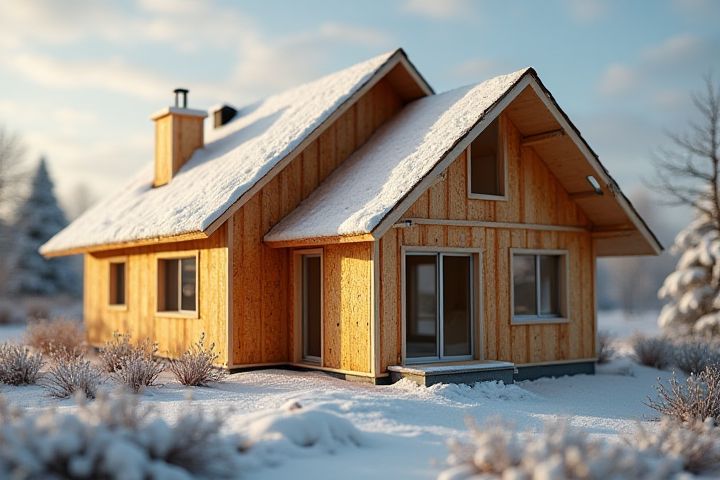
Insulation plays a crucial role in maintaining a comfortable indoor temperature, reducing energy costs, and enhancing overall home efficiency. By limiting heat transfer, insulation helps keep your home warm in winter and cool in summer, resulting in a more stable climate inside. Moreover, properly insulated homes can significantly lower energy consumption, leading to reduced utility bills and a smaller carbon footprint. Insulation also provides soundproofing benefits, minimizing external noise pollution and creating a quieter living environment. Investing in quality insulation not only improves your home's energy efficiency but also increases its market value and appeal.
Why Should A House Have Insulation
Energy efficiency
Insulation is a critical component of energy efficiency in a home, as it reduces heat transfer, keeping your living space warmer in winter and cooler in summer. By installing proper insulation, homeowners can decrease their heating and cooling costs by 20-30%, translating to significant annual savings on energy bills. Improved insulation also lowers the demand for fossil fuels, contributing to a reduction in greenhouse gas emissions by up to 15%. With better insulation, you enhance comfort while promoting a sustainable environment, making it a wise investment for both your wallet and the planet.
Cost savings
Insulation significantly reduces energy costs by maintaining consistent indoor temperatures, minimizing the need for heating in winter and cooling in summer. This efficiency translates into lower utility bills, allowing homeowners to save money each month. Proper insulation also increases the lifespan of HVAC systems, as they don't have to work as hard to regulate temperature, leading to fewer repairs and replacements over time. Investing in quality insulation is not just about comfort; it's a strategic financial decision that pays off in both immediate and long-term savings.
Temperature regulation
Insulation plays a crucial role in temperature regulation within a house, typically reducing heat loss in winter by up to 25% and heat gain in summer by as much as 75%. By maintaining a consistent indoor temperature, insulation minimizes the need for excessive heating and cooling, leading to energy savings of approximately 15-30% on utility bills. This improved temperature control also enhances comfort levels, preventing drafts and hot spots while contributing to lower greenhouse gas emissions. For your home's overall efficiency and comfort, investing in quality insulation is essential.
Moisture control
Insulation plays a crucial role in moisture control within a house, as it reduces the risk of condensation and mold growth. Properly insulated walls, ceilings, and floors can maintain a stable indoor humidity level, preventing moisture from entering the living space. By keeping the temperature of surfaces above the dew point, insulation helps protect structural elements and belongings from water damage, which can potentially lead to costly repairs. You can achieve a more comfortable and healthier home environment by investing in high-quality insulation.
Noise reduction
Installing insulation in your home significantly contributes to noise reduction, creating a more peaceful living environment. According to the U.S. Department of Energy, proper insulation can reduce sound transmission by as much as 80%, effectively muffling unwanted noise from outside and between rooms. Consider using materials such as fiberglass, cellulose, or foam for optimal sound-dampening effects, as these options trap sound waves effectively. By investing in quality insulation, you not only enhance your comfort but also increase your home's value and energy efficiency.
Environmental impact
Insulating your house can significantly reduce energy consumption, leading to lower carbon emissions. Studies indicate that proper insulation can decrease heating and cooling costs by up to 30%, impacting your utility bills positively while contributing to environmental sustainability. By minimizing the reliance on fossil fuels for temperature control, effective insulation helps combat climate change and promotes a healthier planet. Moreover, insulation materials often have recyclable options, further enhancing their eco-friendly credentials.
Fire resistance
Insulation in a house significantly enhances fire resistance, providing crucial time for occupants to evacuate in case of a fire. By using fire-resistant materials, such as mineral wool or fiberglass, you can reduce the spread of flames and smoke, potentially lowering fire damage costs. In fact, homes with proper insulation can achieve a fire safety rating of up to 1 hour, giving you peace of mind. Evaluating the insulation's performance against fire hazards not only protects your property but also prioritizes safety for you and your loved ones.
Indoor air quality
Proper insulation significantly enhances indoor air quality by preventing the infiltration of dust, allergens, and pollutants from the outside environment. According to the U.S. Department of Energy, well-insulated homes reduce the need for heating and cooling, which minimizes the circulation of stale air and improves overall comfort. When insulation is adequate, it helps maintain stable humidity levels, thus preventing the growth of mold and mildew that can negatively impact respiratory health. Investing in quality insulation can lead to an estimated 20-30% reduction in energy bills, creating a healthier living space for you and your family.
Comfort enhancement
Insulation plays a crucial role in enhancing comfort within your home by regulating temperature and minimizing drafts. Properly insulated walls, attics, and floors can reduce the need for heating and cooling systems, resulting in temperature stability, with potential energy savings of up to 30%. This creates a more inviting atmosphere, allowing you to enjoy consistent warmth in winter and coolness in summer. In addition, effective insulation can contribute to noise reduction, helping to create a peaceful living environment, free from external disturbances.
Property value increase
Insulating your home effectively can increase your property value by up to 15%, enhancing its appeal to potential buyers. Energy-efficient homes with proper insulation often attract higher offers, as buyers are increasingly concerned about energy costs and sustainability. In 2022, homes with upgraded insulation sold for an average of 10% more compared to similar properties without insulation. By investing in insulation, you not only improve your living comfort but also position your property as a smart, eco-friendly choice in a competitive real estate market.
